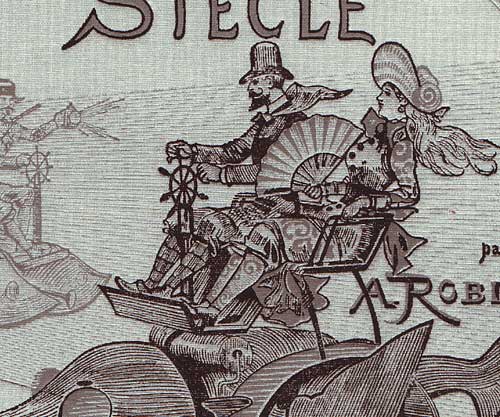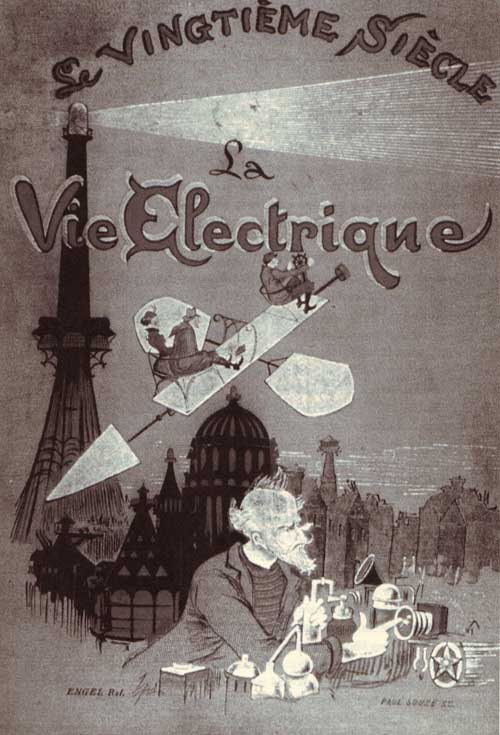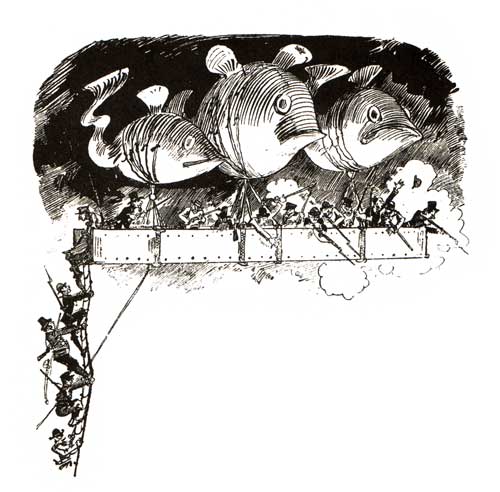First: why aren’t you reading more Squid and Owl? Last week we had assassination by siege engine and undersea regicide. Now we are off on a thrilling mock-Kipling romp. You are a fool not to click.
Next: even more of those psychedelic biology scans up. This one for example:

(Sorry if you’re not into it, man.)
The next thing our skull-bound friend posted was every bit as good. Scans from a 1936 children’s book about Japan. Like this:

That’s a lovely, lovely chicken.
But I don’t want to talk to you about chickens. I want to talk about the future. This is sort of a follow-up to my Taleb post. Here’s a passage from The Black Swan:
This point can be generalized to all forms of knowledge [you’ll get what the point is from what follows]. There is actually a law in statistics called the law of iterated expectations, which I outline here in its strong form: if I expect to expect something at some date in the future, then I already expect that something at present.
Consider the wheel again. If you are a Stone Age historical thinker called on to predict the future in a comprehensive report for your chief tribal planner, you must project the invention of the wheel or you will miss pretty much all of the action. Now, if you can prophesy the invention of the wheel, you already know what a wheel looks like, and thus you already know how to build a wheel, so you are already on your way. The Black Swan needs to be predicted!
But there is a weaker form of this law of iterated knowledge. It can be phrased as follows: to understand the future to the point of being able to predict it, you need to incorporate elements from this future itself. If you know about the discovery you are about to make in the future, then you have almost made it. (172)
I’m interested in this because I’m writing something about Plato’s Meno. You remember his silly argument? I’ll just quote the Stanford Encyclopedia version:
For anything, F, either one knows F or one does not know F.
If one knows F, then one cannot inquire about F.
If one does not know F, then one cannot inquire about F.
Therefore, for all F, one cannot inquire about F.
I’m interested in ways in which Taleb’s point, like Meno’s, is an exaggeration of a basically sound view. (Meno’s version is rather more exaggerated than Taleb’s, I appreciate.) Taleb emphasizes that scientific discoveries come when people are looking for something else entirely. But, although that’s right, I think the power of serendipity as the main engine of scientific discovery can be overstated. Does Taleb overstate his case? What do you think?
What about the history of future? Often, when people write about the future they are just allegorizing the present in some fairly transparent way. That’s what makes it so funny, looking back. But that’s often because they actually are commenting on the present, in some way. They aren’t really, seriously trying to predict the future. They’re just sort of spoofing what they see around them by pretending to project its development forward.
Historically, who are the serious, working futurists? The successful ones (I do appreciate that if you have thousands of people flipping coins, someone is going to get a whole string of heads.) It seems it should be more possible to predict the future piecemeal, as it were. It’s true that trying to predict it all exposes you to ‘black swans’. If you miss one big thing then you miss everything.
OK, that’s enough. Here’s some eye-candy to accompany this theme. I just finished reading a relatively neglected (I think) SF classic, The Twentieth Century, by Albert Robida [amazon].
Published in 1882, set in 1952, it’s not the greatest read but it has some truly inspired bits. I’ll show you some pictures – of which there are many, and which are certainly the best parts.

That’s a cover detail, obviously.

That’s another of the man’s books. Very Verne-y affair it promises to be. (Dames in diving suits on ostrich-back. That’s change we can all believe in.)

That’s Robida. It’s all about the electricity. The next may, despite appearances, need a bit of explanation.

Here’s an inadvertently humorous quote from a Robida descendant, in 1955. Robida foresaw: “aviation, television, gas masks, subways, underwater fishing, helicopters, women’s emancipation, in a word, all that constitutes our lives today.” Well, that’s not quite ALL there is to life today. Robida does get a surprising amount right, honestly, but you only need to miss a few big-ticket items to be fairly badly off the mark, prediction-wise. (Taleb’s point.)
One thing Robida does get surprisingly right is mass media and multimedia. Everyone talks on the telephone all the time, and the televisiphone (or whatever they call it). Robida predicts 24 hour news channels, RSS feeds and podcasting (more or less) and several other developments. He predicts that action movies will pretty much conquer media. Muscular women with big guns will squeeze out classical French culture, in various humorous ways. (He predicted Sigourney Weaver, roughly.)
Some fun details. Mormons take over England after China takes over the Western United States and the British government relocates to India. In 1920 Russia is destroyed. “Bombs set by the mysterious and fearsome Nihilist Party blew up chunks of land several square leagues at ta time, wiping hwole cities off the map in the process! The devices used by these terrorists combined electricity, compressed air, and a mysterious explosive substance eleven hundre times more powerful than dynamite.” Russia is now underwater, Europe is disconnected from Asia (except for Sweden and Finland, which are now on the Asian side of the divide.) In the final chapters of the book there is a bold project to raise a new continent by filling in between Indonesian islands.
French politics involves pre-scheduled revolutions, which helps everyone work out the psychic tensions of modern life. There are contests to construct the best barricades. Aerial barricades, for example. “Mr Barlincourt’s model consisted of a long armored platform one meter wide and eighteen meters long, held up by three small balloons plated with a bulletproof gutta-percha coating.”

Here’s the most BoingBoing of them all. The ‘picturesque barricade’, designed by ‘Mr. Narcisse Boulard, photo-painter.’
Constructed of short-fitted and bolted beams, dirt, and cobblestones, this barricade stands out by the picturesque quality of its design, making it resemble a scale mmodel of a German castle on the Rhine. The beams can be combined in a thousand different configurations to create barricades of all styles. Cost of material and bolts: 250 francs. The inventor generously offers his idea to public domain and shall not take out a patent on it.
That’s enough Robida.
One other link for the night. A few weeks back ASIFA had a great post on futurism and (mostly) mid-century illustration and animation. It includes a Quicktime version of Ward Kimball’s classic “Mars and Beyond”, from 1957, which I highly recommend for its fine cartoon modern qualities. Here are a few screencaps:

Those are the inhabitants of Mercury.

Can’t remember where he’s from, but he’s supposed to have a good memory.


Self-explanatory. I’ll leave it at that.
{ 24 comments }
H.C. Johns 05.13.09 at 3:44 pm
Another great arguement on the theme of knowledge and time was given by Karl Popper in The Poverty of Historicism. He saw that black swan style events more or less undermine any claim to be able to make history into a science…. One would have to know the knowledge of the future in order to make that kind of prediction, but clearly if I know it now then it won’t be discovered in the future, it will be discovered now.
The catch with this and Taleb’s arguments is that they only apply to really paradigm shifting kinds of discoveries. Daily improvements of axes and lawnmowers do often follow something of a curve, but those things are only consquences of earlier paradigm shifters, so the importance of the point still holds, but only in comparatively rare circumstances.
lisa 05.13.09 at 4:00 pm
These are great. Also, the biology illustrations.
I read each installment of Squid and Owl.
This has nothing to do with your post but I thought you might be interested in these mp3s of music no longer in print:
http://78records.cdbpdx.com/
Salient 05.13.09 at 5:30 pm
you only need to miss a few big-ticket items to be fairly badly off the mark, prediction-wise.
And predicting too much flying stuff, in particular, is a surefire way to expend one’s credibility. A common latter-half-of-19th-century mistake, maybe not so much a mistake as a way to ensure sales success. The likely readership was probably captivated by balloon air travel at the time.
rea 05.13.09 at 5:40 pm
The owl and the Cephalopod went to sea
in a beautiful pea-green boat . . .
Lee A. Arnold 05.13.09 at 6:07 pm
Squid and Owl is beautiful. John you may enjoy this old cartoon, with Lord Buckley voicing a beatnik:
Beany & Cecil, “The Wildman of Wildsville” (1959)
Jacob T. Levy 05.13.09 at 6:07 pm
The point is basically sound and yet. I know what someone means when they say cold fusion; but I don’t know how to do it (and neither does anyone else). Wherever one currently stands on the Moore’s Law curve, one knows that it is imaginable to double again, but one doesn’t yet know how to do it. We expect that computing power will continue to increase beyond the limits of current engineering (we expect it now), but that doesn’t really put us at almost-having-made the discovery that will allow it. The same’s surely true throughout biotech. We can envision regrowing spinal cords from stem cells and genetically eliminating predispositions to heart disease or cancer, but these cases are unlike the wheel. Imagining the thing doesn’t imagine away the engineering difficulties between here and there.
Jim Flannery 05.13.09 at 6:37 pm
John, you do know that flickr repository’s just the back end of a blog, right? Where you can get some context for the images, like this one on a children’s book by Mandelstam or this one about Indian pulp covers (latter one particularly up your alley, I’d think).
dsquared 05.13.09 at 6:48 pm
This is actually not a very good argument from Taleb – in so far as it’s anything more than a warmed-over version of Shackle on “crucial experiments”, it’s a clear example of a misapplication of the law of iterated expectations in contexts outside the “small-world” applications where it’s valid. If you want to predict some kinds of things, you need to know stuff about the future which you can’t know. But that’s not “all knowledge” by any means. It’s not even all knowledge about making long run predictions. There are surprisingly many things which do have valid long term trends. The best example that comes to my mind has been the increase in human longevity in the First World, which has followed almost exactly the expected path set out by the actuaries who first drew up the mortality projections underlying Social Security (lots of SS privatization hacks like to claim, falsely, that they got it wrong and “Nobody expected people would start living to 80”, but this isn’t true and the evidence is there in the government records).
Jim Flannery 05.13.09 at 6:53 pm
Ah never mind, I finally found your other post with the link … still worth pointing to Will’s site generally tho, lots of great stuff buried in there.
JM 05.13.09 at 8:07 pm
The owl and the Cephalopod went to sea
in a beautiful pea-green boat . . .
and they took a little bacon
and they took a little beans
and are eaten by Cthulu
while the painted lady screams …
Bill Benzon 05.13.09 at 8:24 pm
Oh, just scrap the EP aspect of Taleb. It’s not worth the time it takes to puzzle it out.
As for Squid and Owl, I think it’s fine, and I don’t even read all of it. I mostly like the pictures.
So, if you could make a (handsome) living off S&O and similar projects, would you kick philosophy to hobby status?
Neil 05.13.09 at 9:50 pm
I am not reading S&O because I can’t get the text big enough t0 read comfortably (firefox 3.10 on mac os x).
Matt Kuzma 05.13.09 at 9:57 pm
“Does Taleb overstate his case? What do you think?”
Yes. Most scientific breakthroughs happen on purpose, albeit of Edison’s 1000-ways-not-to-make-a-lightbulb variety. You can’t predict which method you try will be the one to work, but that’s not the same as it being completely accidental. Only a small portion of discoveries come in the search for something else entirely.
Righteous Bubba 05.13.09 at 10:00 pm
Neil, go to System Preferences and Universal Access and you’ll find a way to zoom to your heart’s content, although in Firefox you should probably be able to hit the control (or command) and scroll wheel to zoom within Firefox.
Alison P 05.13.09 at 10:21 pm
That children’s illustration seems a response to the cry: ‘Japan? Wear the fox hat?’
lemmy caution 05.13.09 at 11:34 pm
Wear the fox hat:
http://www.brutallyhonest.org/brutally_honest/files/FoxHat.wmv
Colin Danby 05.13.09 at 11:37 pm
Well that certainly lit up a lot more of the old cortex than the typical CT post. Those floating fish barricades will haunt the dreams. The ASIFA link was also extraordinary … the mid-century-modern suburban house plus flying saucer … and the department store of the future (http://www.animationarchive.org/pics/venus08-big.jpg) — look, it’s the Johnson Wax building (http://www.solarflarestudios.com/demosites/architecture/images/wright4.jpg)!
Dave Maier 05.14.09 at 12:25 am
I like the Mercury dudes. It must be hard to chill on Mercury, but they seem to be managing it.
jholbo 05.14.09 at 1:57 am
Thanks for all the comments. (These pic posts are often a bit quiet, which makes me worry that people prefer something wordier, here at CT. ) Thanks for the kind words as well and assorted links.
Neil, someday you will be able to buy a hardcopy and read the text in all it’s large glory. In the meantime, Flickr allows you to click to see larger sizes. Although it may be tedious to have to wait for every single page to load. Not a perfect reading experience, I concede.
Owen Futures 05.14.09 at 5:39 am
And it is definitely, definitely French, not a commentary on the human condition. Owen Futures
notsneaky 05.14.09 at 7:12 am
Nah, those pics are great. I’d say something about the law of iterated expectations and hate on Taleb along with everyone else but I still can’t stop thinking about early butt rock, whatever Belle says. If a band expected butt rock before there was such a thing was that band early butt rock or butt rock itself?
Lady with the canon rocks.
John Quiggin 05.14.09 at 11:29 am
Simon Grant and I have a rather dry and technical paper on when it is legitimate to make the kind of ‘small world’ assumption in which you assume you have thought of every relevant possibility. The necessary conditions include probabilistic independence from the rest of the ‘big world’ and also a kind of addivity in consequences, so that your ranking of ‘small world’ outcomes is unaffected by what you get in the rest of the ‘big world’.
The catch is that the only way to determine whether these conditions apply in any given case is from knowledge of the ‘big world’.
And, BTW, Squid and Owl is great.
rcriii 05.14.09 at 4:45 pm
If I can play:
Taleb emphasizes that scientific discoveries come when people are looking for something else entirely.
But you cannot possibly be looking for something else, since having decided what to look for is tantamount to finding it. Therefore nothing ever gets found (or everything is already found).
roac 05.14.09 at 6:20 pm
I went to high school with Ward Kimball’s kids. So what? So nothing, just thought I’d mention it. I never met their father, but I Googled him a while back. He seems to have had more fun in the course of his life than just about anybody you can think of.
http://www.digitalmediafx.com/Features/wardkimball.html
Comments on this entry are closed.